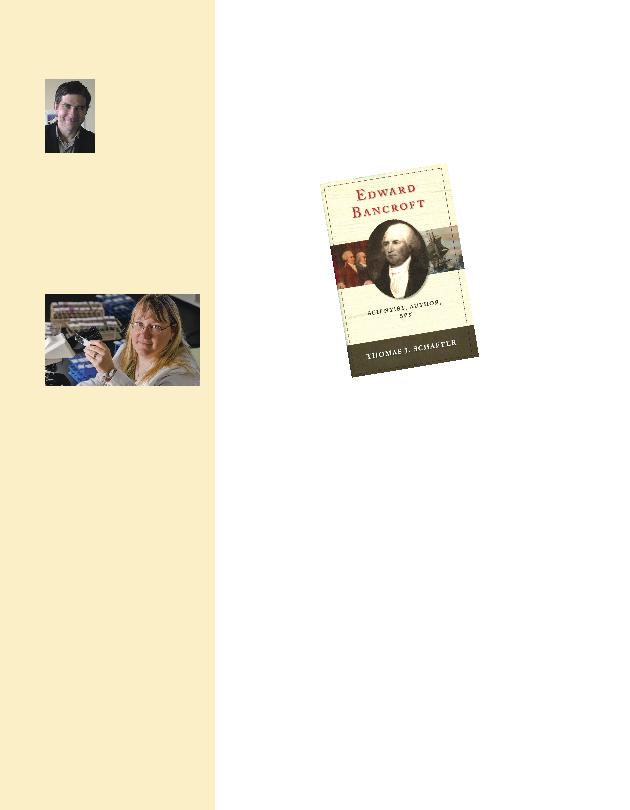
the war. Schaeper was also interviewed
on the John Batchelor Show, which is
broadcast nationally seven nights per
week on the ABC radio network. One
of the main topics of this interview con-
cerns Edward Bancroft's relationship
with Benjamin Franklin and the charge
made by some historians that Franklin
might also have been a British
agent.
croft" is
Schaeper's sixth
book on Euro-
pean and Ameri-
can history.
(1745-1821) might
not be well known to
the general public,
but his name is famil-
iar to all historians of
the American Revolu-
tion. Born in Massa-
chusetts in 1745, he ran
off to sea while a
teenager. He spent some years working
as a physician on plantations in South
America and moved to London in the
late 1760s. There he quickly estab-
lished himself as a natural scientist,
physician, novelist and supporter of
the American cause. Later in life, he
became one of the world's experts on
vegetable dyes.
Benjamin Franklin, John Adams, John
Paul Jones and numerous other Ameri-
cans in Paris. From 1777 to 1783 he
lived in France, and under the guise of
friend and supporter he spied on
Americans.
ting messages in a tree in the Tuileries
Gardens, he regularly sent the informa-
tion he collected to his superiors in
London.
spies in all of history," said Schaeper.
looking through documents in two
dozen archives in Britain, France and
America. One of the most exciting as-
Bancroft's descendants, including sev-
eral distant cousins who live in Lon-
don but did not know each other.
discovered that Bancroft had been a
spy, Schaeper said. "Until then, Ameri-
kites.
interesting -- and actually that's what
made him a good spy," Schaeper said.
croft's importance as a physician and
scientist, and tackles the portrayal of
him as an arch-traitor by other writers.
When the American Revolution
started, Bancroft remained loyal to
Britain. He fully sympathized with
American grievances, but he thought
that the Americans and British would
benefit if the empire held together.
had some grievances, but thought if
they stayed united with Britain they
could be one glorious empire. His ini-
tial hope was that London would rec-
oncile with the colonists," Schaeper
said.
methods and shows how he performed
his spy work without being detected by
astute people like Franklin and Adams.
Schaeper also assesses Bancroft's im-
portance to the British during the war.
sociate professor of
English and director of
the Graduate Program
in English, had a review
essay published in the
journal Postmodern
Ecology of Charles Bernstein's Se-
lected Poems," is online at
http://tinyurl.com/cng7fyx.
He also was interviewed about his
writing for the podcast series, "Into
the Field" (episode #5), hosted by
Steve McLaughlin for the magazine
Jacket2 (June 2011). To listen, go to
http://tinyurl.com/d343vqq.
biology, and her research student,
Alvin Kim, presented two posters at
the Annual National Meeting for the
Society of Developmental Biology
(SDB), held July 21-24, 2011. The ti-
tles and authors of the research pre-
sented were "Localization of CTGF
in mouse embryonic mammary gland
development" by Anita Sambamurty,
Kim, Tiffany Barkley, and Hens, and
"Regulation and expression of CTGF
during adult mammary gland mor-
phogenesis" by Kim, Sambamurty,
Barkley and Hens. In addition, Hens,
Kim and Jennifer Andrews published
a review article titled "The Role and
Function of Cadherins in the Mam-
mary Gland" in Breast Cancer Re-
search.
e identidad del feminismo en la
Poesía de Clementina Suarez" for the
journal Cuadernos del Lazarillo, Re-
vista Literaria y Cultural, which is
published in Salamanca, Spain. She
also attended an international Confer-
ence on Hispanic Literature in Cuzco,
Peru, to present on "La voz y la ima-
gen feminista de Eva Perón."